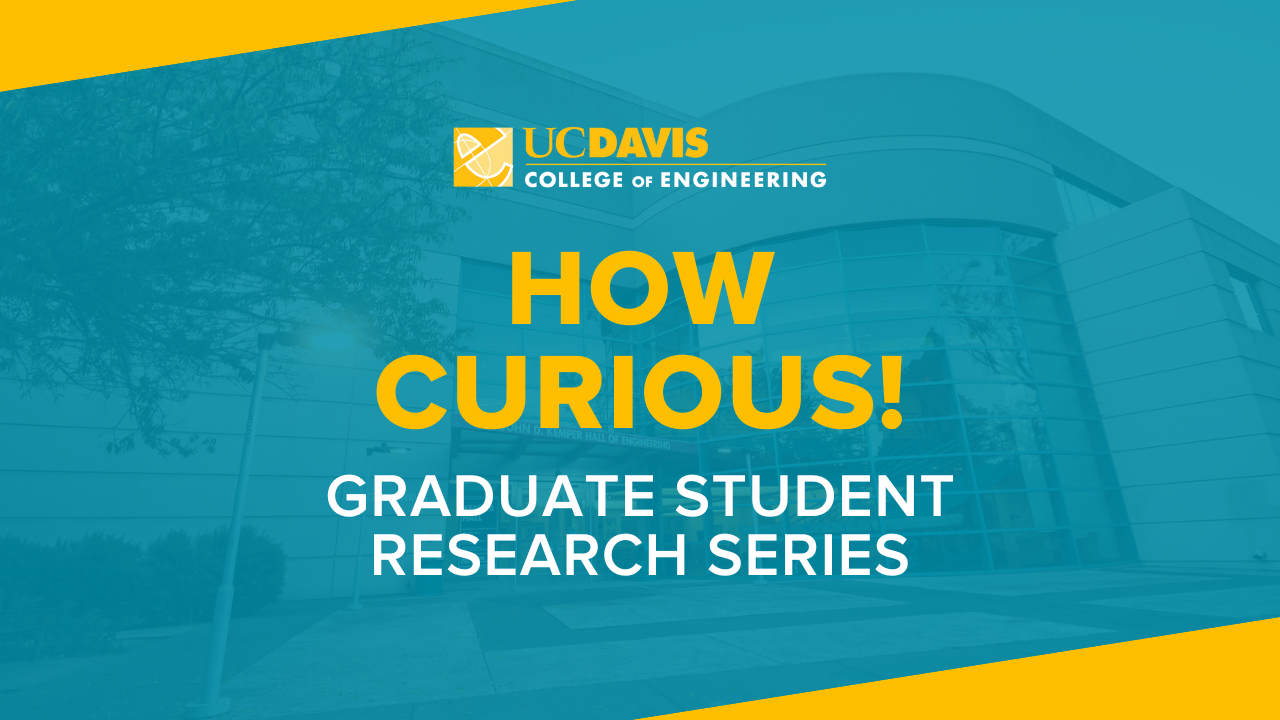
Event Date
How Curious! offers graduate students in master's and Ph.D. programs in the College of Engineering an opportunity to present their research findings and engage in scholarly discussions with their peers and faculty members. The goal is to foster collaboration, encourage intellectual exchange and support the professional development of our graduate student community.
Scheduled Presenters
Afshan Qumar | Energy Systems
Presenting: Smart Home Central Control for Price-response and Capacity Management
Building electrification poses significant challenges, including the need for electrical panel and service upgrades, which represent a considerable cost barrier to decarbonization. Additionally, the emergence of dynamic electricity pricing, driven by grid patterns such as the duck curve, highlights the need for flexible load management strategies that can shift or shed demand to optimize costs and support grid stability. Current solutions, such as relay-based smart panels, address panel capacity constraints by disconnecting loads. However, these approaches often interrupt service and risk damaging sensitive appliances, creating the need for more advanced and adaptive solutions. This study proposes a two-layer control system that integrates optimization and real-time control to address these challenges. The first layer employs a Model Predictive Control (MPC) approach to optimize device setpoints and schedules, considering both dynamic electricity prices and panel capacity limits. The second layer implements a rule-based control system to monitor real-time conditions and dynamically adjust operations, such as ramping down or curtailing loads, to prevent overloads and ensure continuous service. Field testing demonstrates that the proposed system effectively manages loads, ensuring that total demand stays within panel capacity while optimizing energy costs. Key insights and recommendations for further advancements in system-level load management are also presented.
Bio: Afshan Qamar is 4th year Ph.D student in the Energy System graduate program, advised by Professor Kelly Kissock. Their research focuses on electrification and demand response in buildings. I am also broadly interested in EVs integration in buildings and demand flexibility.
Andrew Arends | Mechanical and Aerospace Engineering
Presenting: Astronaut-Powered Laundry Machine
Without a precedent to laundering clothes off-Earth, a preliminary solution is required to develop a spaceflight laundry machine. The research aims to produce a method and proof-of-concept device to sustain and maintain laundering and exercise performance regardless of the gravitational field, habitable environment, and human operator on space missions. The proposed solution is a stand-alone machine that uses astronaut exercise to launder textiles. The single activity reduces logistical strain on crew time, soiled garment management, and mission resupply. Human exercise simultaneously powers a hydraulic pump, electrical generator, and textile agitation mechanisms. Hydraulic valves dictate the laundering process and exercise resistance. The hydraulic system is closed loop containing sensors for monitoring the state of the washing water and water treatment technologies. The primary contaminants to monitor and remove are particulates (dead skin, lint, and lunar regolith), salts, and biofluids. Similar water treatment methods on the International Space Station will treat the water to acceptable laundering levels (screens, UV sanitization, and ion resin beds). Data from cardiovascular loading across various laundry environments (vibration agitation, water filtration, and wringing) will be used to validate exercise capacity. Wringing effectiveness will be determined from the final water retention in textiles as a function of time.
Bio: Andrew is a first-year Ph.D. student in the Mechanical and Aerospace Engineering program, advised by Professor Stephen Robinson. His research focuses on improving human health and logistics for space missions, and he is also interested in mechanical design, textile science, material science, water treatment, chemistry, and human physiology and psychology in the context of human spaceflight. Andrew also holds a copyright for the development method for an astronaut-powered laundry machine and has spoken multiple times at the International Conference on Environmental Systems.
Michelle Fu | Biomedical Engineering
Presenting: A Microfluidic Platform to Capture Tumor-Antigen Specific T-Cells
Tumor-specific T-cells are essential for immunotherapy, but isolating these cells remains a challenge due to the limitations of traditional approaches due to high costs and risks of non-specific toxicities. This study explores the use of a microfluidic device for affinity-based enrichment of tumor-specific T-cells, aiming to address these challenges. The device architecture includes eight parallel channels with varying widths, creating different shear stresses while maintaining consistent flow rates. Specific T-cells with high binding affinity to antigens adhere under shear forces, while non-specific cells are washed away. Two key parameters—enrichment (the proportion of tumor-specific cells among adhered cells) and sensitivity (the proportion of infused tumor-specific cells that adhere)—were used to evaluate device performance. We lentivirally transduced a T cell line (JURKAT) to express a TCR to melanoma antigens MART-1 and a clone of transduced JURKAT cells (C6) that has high expression of the TCR was selected for this study. Peripheral blood mononuclear cells (PBMCs) obtained from healthy donors were mixed with the MART-1-specific C6 cells at various proportions and perfused through the device. Perfusion experiments demonstrated the ability to isolate tumor-specific cells effectively, with higher enrichment observed under increased shear. Sensitivity trends highlighted the need for further optimization of flow rates.
Bio: Michelle Fu is a first-year Masters student in the biomedical engineering graduate program, performing research under Dr. Venktesh Shirure in the Steven George Lab. Their research focuses on T-cell and B-cell enrichment/capture using microfluidic devices. Prior to attending UC Davis, Michelle obtained a BS in environmental science from UCLA where her research focused on environmental DNA and species distribution.
